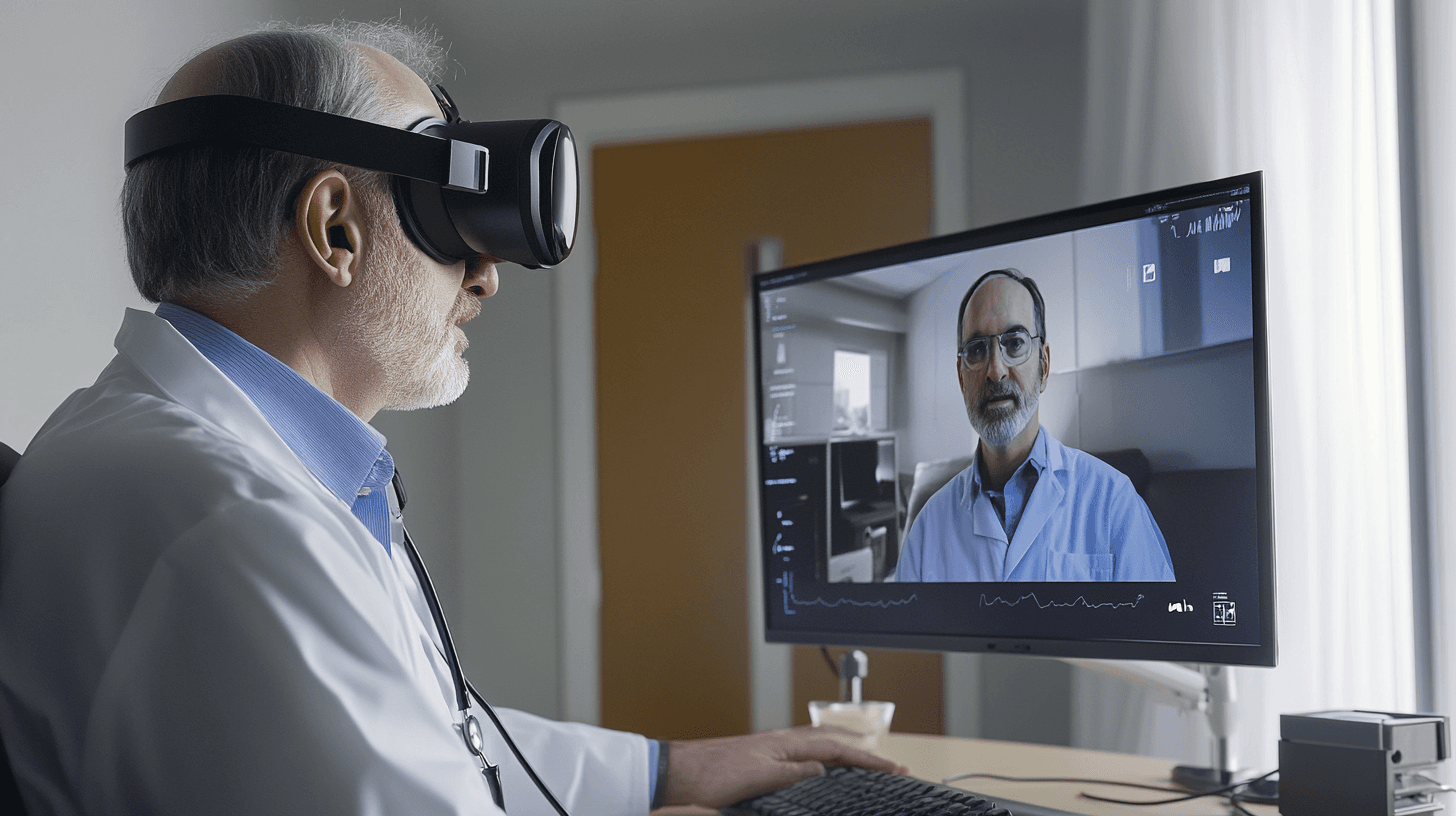New healthcare technology for the year 2025 is transforming the health technology landscape and continues to shape patient care and medical practices. Healthcare technology trends are bringing about unprecedented changes in the manner in which medical professionals diagnose, treat, and monitor their patients.
Emerging technology in healthcare creates more efficient and accessible care systems. The convergence of artificial intelligence, remote monitoring, and digital innovations represents a major health technological leap forward to deliver medical services that could once be considered impossible to realize.
The future trends in healthcare technology are quite apparent in the fast-moving changes that AI-driven solutions and the Internet of Medical Things are making to the very roots of traditional healthcare models. Advances in medical technology and healthcare, especially new ones, allow healthcare providers to be more personalized, predictive, and proactive in their delivery. These new advances in healthcare technology have increased access to health services across many populations that have previously been deprived of the same.
These developments in medical technology and healthcare are experienced not only in clinics but also in models of patient engagement and care delivery. As 5G networks mature and more advanced digital platforms are developed, new healthcare technology leads to seamless connectivity between the patient and the provider. This is really important because healthcare organizations across the globe will be embracing digital transformation to enhance the quality of care and efficiency of their operations. This integration into healthcare technology trends promises an opportunity for developing a more connected, efficient, and patient-centric ecosystem that will revolutionize medical care in the years ahead.
AI and Predictive Healthcare Technology Trends
Machine Learning and Diagnosis
New healthcare technologies are revolutionizing possibilities in the realms of diagnostic capabilities through AI-powered platforms that can amaze people with their level of accuracy in medical imaging and disease detection. Emerging technology in healthcare can analyze complex medical data, improve the accuracy of diagnosis by 40%, and reduce patient wait times by 30%. Healthcare technology trends reflect that AI diagnostic tools achieve accuracy rates of over 90% on medical benchmarks, especially in fields such as radiology and pathology assessment.
Predictive health risk assessments are yet the future trend in healthcare technology in that AI algorithms determine future problems before they become critical with their analyses of patient data. These new technology advances in healthcare help healthcare providers spot cases such as septic shock well 12 hours before an incident occurs and predict diabetic admissions of a patient according to several factors on their case. Advances in medical technology and healthcare have paved the way for creating advanced models of risk profiles involving a great deal of information: history, vital signs, and genomic data.
Administrative automation is considered one of the medical technologies and improvements in health care with AI-driven systems. They decrease the administrative burdens that compose one-quarter of healthcare expenses. Technological changes in healthcare have meant innovations such as automatic documentation, scheduling, and billing, and health services professionals spend more time focusing on the patients while keeping the cost operations.
Generative AI Applications
Revolutionary change in clinical documentation, new healthcare technology, advanced generative solutions, and innovative AI systems for a complete documentation turnaround by itself can transcribe a doctor's notes, compile reports, and keep healthy record-keeping to industry-high standards, HIPAA, for instance. It appears the use of ambient AI scribes has reduced physician documentation tasks during after-hours patient sessions.
Inpatient data summarization technology in healthcare has evolved to produce concise, accurate summaries of clinical information. Recent research indicates that AI-powered summarization can outperform human expert summaries in terms of completeness and correctness. These new technologies in healthcare are extremely helpful for processing and analyzing big records of patients in a manner that enables clinicians to easily access the information in a timely manner in order to make the proper decisions.
Clinical workflows use AI today, automating routine tasks while offering real-time data analysis with predictive insights for improved medical technology and health in optimized resource use, lessened errors in medical operations, and coordinated patient care. The healthcare facilities also report that the deployment of emerging technology in healthcare solutions has ensured tremendous improvement in operational efficiency, as the hospitals have managed to speed up bed assignment times by about 38%.
Remote Healthcare Technology Trends
Advanced Telemedicine
Advances in medical technology and healthcare are revolutionizing the delivery of virtual care through immersive consultation experiences, transforming conventional telehealth interactions. Advanced technologies in healthcare today have equipped healthcare providers to perform complex examinations using augmented reality overlays and 3D visualization tools to ensure engaging and effective remote consultations. Thus, such new technologies in healthcare solutions allow the visualization of complicated medical data on time so that doctors might do virtual consultations in a more intuitive manner with interaction pertaining to patient information.
Some of the healthcare technology trends are best indicated through the integration of extended reality. They ensure an accurate diagnosis and appropriate treatment planning. New advances in healthcare technology help experts show patients 3D views while explaining their treatment to make complicated medical discussions much more comprehensible. Thanks to advancements in health technology, doctors can now virtually sit down with a patient and discuss assessments in detail, providing precise guidance and on-site assistance.
Hospital-at-Home Programs
Advances in medical technology and healthcare have provided an avenue for the growth of expanded hospital-at-home programs, directly delivering acute-level care to patient homes. Emerging technology in healthcare involving remote monitoring systems allows the follow-up of vital signs and control over medications with prompt changes in patient conditions that give instant feedback. These new healthcare technologies & innovations create a very expansive environment for care, which can be just as holistic as it would in inpatient settings but in an environment that is more hospitable and convenient for the patient.

Technology in healthcare has especially enhanced postoperative monitoring capabilities through sophisticated systems of remote patient monitoring that permit early detection of complications and timely intervention. New technology advances in healthcare would allow care teams to conduct remote assessments of surgical wounds, monitor the functional status, and ensure proper pain control with significant recovery outcomes. Continuous monitoring of patient mobility and vital signs is available through the integration of ambient sensors and wearable devices, therefore providing an effective digital safety net for people recovering at home.
Emerging technology in healthcare allows the eligibility of patients for programs to be extended into hospital-at-home programs, mainly targeted at chronic care or even complex care management. With the aid of IoT-enabled devices and telemedicine platforms, such programs deliver inpatient care supported by mobile care teams who can also offer hands-on treatment in cases of necessity. Together, remote monitoring technology and virtual consultation guarantee the full delivery of care while still in the comfort of the home setting.
Internet of Medical Things
Connected Medical Devices
The Internet of Medical Things (IoMT), that is, new technology in healthcare, revolutionized the patient care experience by creating an interconnected ecosystem involving devices and applications in this line. Technological trends in healthcare indicate the rise of connected medical devices, wearable fitness tracks, and smart implants, which will change the practices of monitoring and offering healthcare. The emerging technology in healthcare allows continuous health monitoring, data collection, and real-time analysis of patient conditions.
One area of healthcare technology in which future trends are well manifested is the domain of wearable health technology, which has moved from merely tracking fitness into smart medical monitoring devices. Advances in healthcare technology are creating smart medical implants capable of actively monitoring vital signs, adjusting treatments, and even communicating with healthcare providers. Advances in healthcare technology ensure that patients receive precise, customized care while making visits to hospitals less necessary.
Suggested Read
How to Handle Medical Device Data Streams in Your HealthTech App?
View Blog
Data Integration and Analytics
Due to this innovation in health technology, today, humongous data collected from a large variety of sources can be culled and analyzed. As a result of innovations in medical and healthcare technologies, interoperability between the varied systems has increased significantly, making data exchange between healthcare providers seamlessly possible. Real-time data processing and analysis by these new healthcare technology platforms would now enable the provision of actionable insights that would be helpful for healthcare providers in making informed decisions.
Suggested Read
A Comprehensive Guide to FHIR, HL7, and Beyond in HealthTech
View Blog
Healthcare technology has especially progressed in the capability of health analytics platforms to process complex health data from several sources at once. The health analytics platforms use artificial intelligence and machine learning algorithms to detect patterns, predict possible health issues, and suggest interventions that suit individual needs. Healthcare technology has evolved to include real-time monitoring systems that can pick up slight changes in the conditions of patients and alert healthcare providers when intervention is needed.
The integration of IoMT devices in healthcare systems has built up a more connected and efficient healthcare ecosystem. With the help of this technology, not only can a patient's monitoring and service improve, but operational efficiency is also improved in healthcare units. IoMT is that technology that transforms conventional methods of health care services to make them more proactive and preventive.
Precision Medicine and Personalized Care
Genetic Profiling
New technology in healthcare has completely changed the medical treatment procedure in terms of precision medicine. Based on the individual's genetic profile, disease prevention and treatment methods change. Presently, through advances in medical technology and healthcare, service providers are not required to remain in the age-old single-size-fits-all attitude of traditional methods; genetic information can be used for custom-made treatment plans. New technologies in healthcare enable doctors to predict which treatments will work best for specific patients based on their genetic makeup, environmental exposure, and lifestyle choices.

Identification and development of biomarkers are pretty apparent as future trends in healthcare technology. New advances in healthcare technology allow healthcare providers to identify molecular fingerprints of diseases that can help categorize patients into more precise treatment groups. Such innovations in healthcare technology help in the development of a diagnostic test that can figure out which treatments will prove most effective, thereby removing trial-and-error prescribing from the practice.
Data-Driven Healthcare Technology Trends
Because advances in medical technology and healthcare have allowed for the coming together of diverse data streams to form a comprehensive picture of a patient, progress in healthcare technology now incorporates both the collection and analysis in real-time of patient information emanating from wearable devices, electronic health records, and environmental sensors. New healthcare technology platforms are able to process such streams of diverse data and present tailored interventions according to specific patient needs and responses.
Significant technologies in healthcare development that integrate lifestyle factors and environmental considerations are available. Integrating socio-economic status and emotional health in the overall treatment of healthcare providers, together with the physical environment, has always been allowed due to this medical technology and healthcare development. The new-emerging technologies in healthcare, for example, provide ways through which many ways of intervening affect treatment.
Precisely, these technological strides in precision medicine in healthcare systems are altering the way care is given by providing further accurate diagnoses of diseases with targeted treatment. It saves not only through effective treatment but also helps save money put into healthcare. Savings are facilitated through the abstinence of unnecessary treatments along with adverse drug reactions. This approach of genetic profiling, in conjunction with data-driven healthcare, represents a fundamental shift in medical practice, promising improved outcomes through more personalized and precise medical care.
Extended Reality in Healthcare
Clinical Applications
New technology in healthcare is transforming clinical practices with XR solutions that make surgical precision and patient care possible. Technologies in healthcare indicate that XR helps surgeons to see their anatomy in 3-D for complex structures and to carry out procedures with accuracy that they never thought existed before. Such emerging healthcare applications of technology offer immersive practice environments for surgeons and other physicians who can perform complex procedures without threatening a patient's life at all.
Future trends in healthcare technology are very prominent in rehabilitation programs, where XR creates interactive therapeutic environments for patients to recover from injuries or surgery. New healthcare technologies provide the capability to offer tailor-made rehabilitation exercises through virtual environments that evolve according to the improvement of the patient. Technologies in the healthcare sector also revolutionized mental health treatments through VRET, thus providing safety to the patient in addressing and coping with their illness.
Medical Education
Advances in medical technology and healthcare bring revolutionary changes in the manner in which medical education can happen. Technological advancements in healthcare allow students to explore a precise 3D model in anatomical detail beyond studying static images and plastic models used traditionally. New healthcare technological platforms bring forth real simulations that will repeat the procedures for medical student practice, thereby improving the individual's skills and confidence levels in his practice.
Technology in healthcare has especially improved simulation-based training, and XR provides scalable and personalized learning experiences. Advances in medical technology and healthcare allow medical institutions to standardize training while at the same time adapting to the individual needs of learning. The new technology in healthcare has made professional development possible through virtual collaborative environments and has allowed healthcare professionals to attend advanced training sessions regardless of where they are located.
The integration of XR in medical education is a paradigm shift from the traditional methods of teaching. It enhances visualization capabilities and offers interactive learning experiences, thus improving knowledge retention and skill development. This technology has been found to be especially useful during healthcare crises because it allows for continuous medical education while keeping safety protocols in place.
Future of Patient Care
Technology trends in healthcare fundamentally transform patient engagement by developing innovative digital solutions and mobile platforms. Healthcare providers are able to design a more interactive and personalized experience that enhances patient outcomes and increases patient satisfaction due to the advent of new technology in healthcare. The new healthcare solutions that emerge are in the form of digital health platforms, mobile applications, & gamified experiences—all that engage patients in their journey toward recovery.
The future trends in healthcare technology represent a giant movement toward patient-centric digital engagement tools. Patients have the opportunity to get their medical information, communicate with the provider, and manage care through their mobile platforms because of healthcare technology advancement. Healthcare technological innovation has primarily improved engagement between patients through gamification elements that change the process of ordinary health activities to exciting experiences.
Technological advancements in healthcare create an unprecedented opportunity for patients to communicate with their care providers using digital health solutions. Advances in medical technology and healthcare thus create opportunities for real-time monitoring, personalized feedback, and automatic reminders that may assist patients in staying engaged with their providers. Mobile health platforms are becoming more advanced, such as secure messaging, appointment scheduling, and telehealth visits, which enhance access and convenience.
Health gamification is considered to be one of the newest developments in healthcare technologies, wherein the incorporation of point-like elements, challenges, and rewards motivates a patient to participate actively in care plans developed by healthcare providers. In reality, these healthcare solutions have demonstrated promising outcomes with regard to improvement in adherence to medication intake, promoting healthy behaviors, and patient engagement in long-term treatment plans.
This interconnected and efficient healthcare ecosystem can be created through the adoption of these emerging technologies. The digital patient engagement platform not only allows healthcare practitioners to deliver personal care experiences in a real-time manner by knowing the progress of the patients but also intervenes just in time. This process of change in healthcare technology trends has brought better clinical outcomes, lower healthcare spending, and increased overall patient satisfaction with the care received.
As healthcare technology trends continue, Solutelabs remains leading by driving the trends that the future of healthcare technology shall provide through its cutting-edge software solutions. New developments in healthcare technology are making overhauls in delivering patient care; SoluteLabs is expertly good at developing healthcare applications that align directly with emerging healthcare needs.
Their commitment toward advancing the digital health solution can be highlighted as how technology trends within healthcare may be effectively carried out toward improving patient outcomes. In the future, trends in healthcare technologies will require strong partnerships on the technological front, and Solutelabs will continue bringing new technology that suits the demand in healthcare. In a highly innovative way, the healthcare software that they design will help the healthcare provider take advantage of the technological progress in healthcare and deliver their services using secure, efficient, and patient-centered systems.
For organizations choosing partners, see our roundup of top healthcare IT consulting companies to compare expertise and services.






